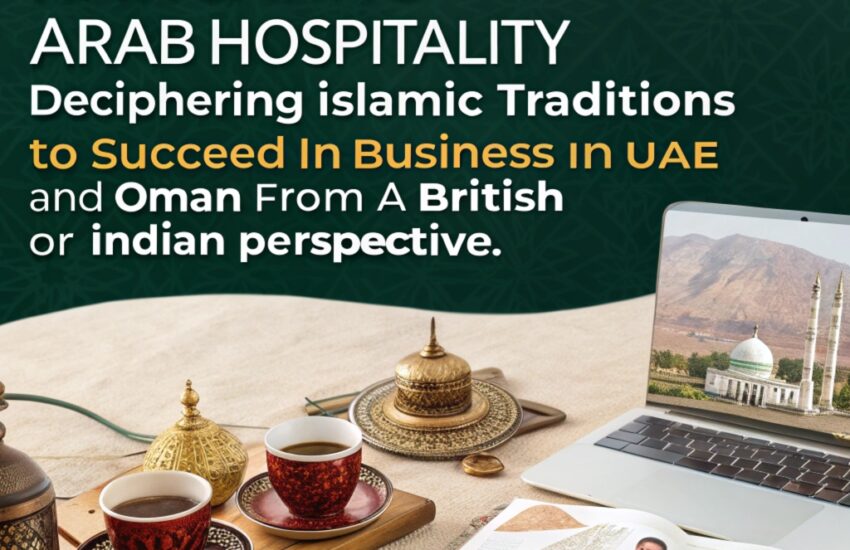
Are you ready to uncover the secrets of successful business travel in two of Arabia’s most prominent economies?
As a seasoned traveler, I’ve experienced firsthand the warm hospitality that Arab cultures are known for – but often misunderstood.
From breaking bread with Bedouins to navigating intricate customs and traditions, it can be overwhelming trying to navigate these uncharted territories without guidance.
Understanding Zaffa with a Business Perspective – The Key to Arab Hospitality
It’s when you arrive in Dubai or Oman and are greeted with open arms, a warm welcome is expected from your hosts. In these countries, hospitality is deeply rooted in Islamic tradition and is considered essential for building strong relationships.
As part of this tradition, the concept of Zaffa comes into play. This word has two meanings – to receive guests warmly but it also implies that the host must make concessions or sacrifices on their own behalf for the comfort and enjoyment of visitors. So when a business meets its clients in Dubai or Oman, they need to be aware of this custom.
Businesses operating here are not merely looking for transactions; they should see themselves as hosts who have been invited into someone’s home to share meals, drink tea and engage with locals. In such situations you can build trust faster by being respectful of customs and traditions which often start with the greeting rituals in public places or even at business events.
When meeting people from other cultures for work purposes, understanding the local culture is a key component that helps in forging long lasting professional relationships. This includes learning how to extend your hand when receiving gifts – something considered an honor among Arabs- as well as knowing not to shake hands with someone who hasn’t offered theirs first.
It’s also common practice in Arabian business etiquette for the host to ask you a series of questions before inviting you into their workspace or home – typically this includes how many children they have, what kind of work they do and other personal details. This is done out of respect but also serves as an icebreaker so that both parties can establish trust with one another.
In business settings it’s often expected to present gifts such as perfumes, chocolates or dates upon entering a country like UAE in order to break the ice – show your appreciation for their hospitality and mark the start of any new venture. These gestures may seem trivial but they carry significant weight in Arabian cultures.
Customising Your Welcome for Guests with Unique Needs
In order for British or Indian entrepreneurs navigating their way through UAE and Oman, understanding Arabic hospitality customs is crucial. To effectively establish meaningful relationships with your Middle Eastern clients, it’s vital to grasp these cultural nuances.
When guests arrive at your home in the region, they expect certain customs and traditions to be followed – a concept known as “Tamizji”, which encompasses respect for their heritage and way of life. Considerate customizing your welcome for guests with unique needs will set you apart from others who may not take the time to understand these norms.
For example, when greeting an elderly guest in Arabic culture, one might perform the “Ramiah” gesture – a gentle touch on their foot followed by their hand as a sign of respect. Additionally, phrases such as “” (Marhaba) or “” (Mabrook) can be used to welcome someone home from travel or celebrate good news.
Similarly, when hosting guests in your home for the first time, it’s customary to remove your shoes before entering – an essential aspect of maintaining “Tahajjud” space. This is because footwear carries dirt and bacteria that may contaminate sacred areas within Arab households; by removing them you minimize cross-contamination. Not only should you ensure this practice, but also refrain from serving food with both hands – instead, use your right hand to provide for guests as using the left can be seen as impolite.
In today’s fast-paced business environment, being aware of these cultural norms not just enhance relationships with Middle Eastern partners but boost one’s professional reputation. When hosting clients or colleagues in the Gulf region, it is essential that you embody respect and understanding. This not only makes a positive impression on first impressions but fosters trust throughout your working relationship.
When entertaining international clients from the UAE and Oman, demonstrating an awareness of Arabic hospitality norms can help build lasting connections. By implementing these customs at your workplace or event spaces, you’ll be taking a significant step towards establishing yourself as a culturally sensitive business partner in this unique market.
Islamic Traditions and their Impact on Business Relationships in the UAE and Oman
Navigating Arab Hospitality: To succeed in business settings in UAE and Oman, it’s crucial to understand Islamic traditions. They can make all the difference between building trust with clients and colleagues.
Greetings are an art in Arabic culture, especially when meeting with people from different backgrounds. You should greet everyone with respect by saying “Assalamu alaikum” (peace be upon you) when entering someone’s office or meeting room, regardless of their job title. This simple phrase can set a positive tone and break the ice.
In business settings, it’s essential to know your way around Arabic greetings. For example:
* When meeting for the first time, use “Marhaba” (hello) followed by “Assalamu alaikum.”
* Upon departure, say goodbye with “Ma’a as-salaama” (goodbye).
* When greeting someone of higher rank or authority, it’s customary to bow your head slightly and extend your right hand for a handshake.

However, physical contact is also crucial in Arabic culture. While being too friendly might be misinterpreted in some cases, avoiding touch altogether can create discomfort. In business settings:
* Shake hands with both hands when greeting someone of equal status.
* When eating or drinking with clients from the UAE and Oman, use your right hand to show respect for their custom.
By embracing these traditions, you’ll not only build stronger relationships but also foster a sense of trust and rapport among Arab colleagues. To take it a step further:
Use visual cues like eye contact and body language to convey interest.
Make sure to dress modestly when meeting with clients or attending cultural events.
Respect the region’s diverse practices around physical touch, from light handshakes in Dubai to more reserved interactions in Muscat.
It’s not rocket science; just being mindful of these simple gestures can make a significant difference. In UAE and Oman, Islamic traditions are woven into everyday life – embracing them will help you navigate business relationships like a pro.
Respect is an essential trait when meeting with Arabic people.
Avoiding Common Misunderstandings when Meeting Local Customs
When meeting local hosts in UAE and Oman, a warm welcome can make all the difference – let’s learn from my friend Amira, who landed a major deal with an Emirati client after mastering the art of Arab hospitality.
In many Middle Eastern cultures, shaking hands is more than just a gesture; it’s an expression of respect and trust. In fact, handshakes are considered less common in Oman compared to other countries like Saudi Arabia or Kuwait. By adapting to local customs from the start, you’ll not only build strong relationships but also demonstrate your willingness to learn and adapt.
When greeting Emirati men for the first time, a double cheek kiss (known as “salam”) is customary – but be cautious of cultural differences when interacting with female colleagues or clients. Instead of air-kissing them back, women are often advised to lightly tap their cheek instead. This may seem trivial, but mastering these social cues will help you build trust and rapport with your new partners.
Here’s a helpful tip: observe how others greet each other – in this case, Amira noticed that her Emirati colleagues would exchange warm smiles before greeting each other with handshakes or double cheek kisses. By mirroring their behavior, she quickly won over her clients’ hearts (and minds).
When meeting local business partners, dressing modestly is essential to show respect for the culture you’re entering. For women, this means avoiding skin-tight clothing and instead opting for loose-fitting garments that cover your arms and legs. Consider pairing a tailored blouse with fitted trousers or jeans – but be mindful of the type of fabric; avoid anything too flashy or revealing.
When interacting with male colleagues, keep in mind that they typically dress conservatively as well. While this doesn’t mean you need to follow suit exactly, being attired modestly can go a long way in building rapport and avoiding misinterpreted gestures.
Incorporating traditional elements into your business attire is an easy way to demonstrate cultural sensitivity – like Amira did when she added a scarf or shawl to her outfit during meetings. This subtle touch of local flair shows that you’re making an effort to understand the culture, not just going through the motions.
The consequences of cultural faux pas can be severe in Arab business settings – but with awareness and respect, your professional reputation will shine brighter than ever before. So why wait? Start building bridges today by mastering these essential social cues for success in UAE and Oman!
Greet Your Hosts like a Pro – Handshakes, Eyebrow Raising Techniques
To succeed in business in UAE and Oman, it’s essential to understand Islamic traditions that shape social norms. When meeting with Middle Eastern clients or colleagues, a well-executed greeting can make a significant difference in building trust.
In many Arab countries, handshakes hold weight more than just a common greeting. A firm handshake conveys confidence and respect – think of it as saying “I’m here to do business.” But avoid weak or limp shakes that might be perceived as weakness or lack of interest. Instead, use both hands to shake their hand with purpose.
When eye contact is direct, you’ll show interest in the conversation; prolonged stares can feel aggressive or confrontational – like staring into a stranger’s soul for too long! Aim for an average of 5-10 seconds to strike the right balance between confidence and respect. For those new to Arab culture, practice makes perfect: rehearse your eye contact skills before meeting clients.
Pay attention to non-verbal cues that show respect but don’t overdo it – a slight bowing or head incline during Ramadan is acceptable, yet excessive bending might give the wrong impression of subservience. Non-business situations are best left unexamined; focus on adapting to local customs in business settings.
When receiving an invitation from your host for tea or coffee, accept graciously and with gratitude – it’s a sign that you value their hospitality. Bring small gifts like dates or chocolates as symbols of respect (just ensure they’re halal-approved). This thoughtful gesture will help smooth the waters between you and your Middle Eastern hosts.
One final thing to keep in mind: avoid public displays of affection, even for close acquaintances or colleagues – a simple hand on the arm can give wrong signals. To stay ahead in business with Arab clients, master these cultural nuances like a pro!
By grasping Islamic customs related to greetings and interactions, you’ll be well-equipped to navigate Middle Eastern hospitality successfully.
Finding your Place at the Table – Seating Arrangements that Work for Everyone Involved
When dining with business partners or clients from Arab cultures, it’s essential to understand the traditional seating arrangements that command respect.
In many cases, when seated on one side of a head-of-table guest in traditional Arabic settings is not just polite but also reflects a high level of esteem within their position. This can result in unintentional offense if you don’t follow this rule.
For example, younger guests are generally expected to sit across from older individuals during meals, maintaining an equal power dynamic that affects the conversation. This subtle yet significant consideration demonstrates respect for your hosts’ family members or colleagues and avoids unnecessary misunderstandings.
When choosing where to sit during a meal in Arab cultures, make sure there’s a gap between plates for food and drinks on the table so you don’t have to lean forward while eating or reaching over others. The Lowdown: This helps prevent accidents and maintains good manners.
Key Takeaway:
- If your host indicates that they will lead the conversation.
- Pay attention to their body language, tone of voice, and other nonverbal cues during meals.
To navigate social situations with confidence and show respect for your Arab hosts when dining together, make sure you follow these guidelines.
Gift Giving in Arab Culture- What’s Expected and What You Should Avoid
When visiting someone’s home in UAE or Oman, it’s essential to bring gifts that reflect good manners. Dates, nuts, and perfume are classic choices.
However, high-end jewelry is a hard no-go. Gifts of such luxury can be perceived as arrogant or overly generous by the host’s family members – especially if you’re not familiar with them. Opt for more modest gestures like baking cookies or helping with household chores instead.
The same goes when receiving a gift from an Arab host; it’s customary to display the gift prominently until you’ve had a chance to return it as a sign of gratitude. This thoughtful act demonstrates your willingness to reciprocate and show appreciation for their kindness.
It’s not just about avoiding expensive items or flashy designs but also considering the host’s lifestyle. For example, bringing a book or plant might be more suitable than physical gifts that could clutter their space. Your aim should be to find common ground in local customs and traditions – like dates being an essential part of Arabic hospitality.
The key takeaway is cultural sensitivity: understanding what’s appropriate in these situations will make all the difference when navigating Arab hospitality.
The Role of Food in Business Entertaining – From Dates to Desserts
In Arabian culture, food is not just a necessity but an art form of hospitality that can make or break business relationships. When entertaining clients in UAE or Oman, it’s crucial to understand the significance of Arabic sweets and their role in fostering trust and respect.
Consider learning how different types of dates are used throughout Arabian history – for instance, during Ramadan, symbolically sweeten your gestures with a selection from this list: fresh green cardamom-drenched dates or dried apricot-studded date clusters. When preparing for business entertaining in the UAE or Oman you must consider what will not only taste good but also symbolize respect towards your host culture.
You can begin by bringing traditional sweets like kunafeh, ma’amoul cookies, or Arabic coffee cakes to meetings. These sweet treats hold significant cultural meaning: kunafeh represents comfort and warmth while adapting it for business settings requires understanding its texture and flavor profile; ma’amoul’s long history of being shared during holidays makes them an excellent choice when you want to build connections with clients over a shared experience, like Ramadan festivities; baklava’s layers tell the story of timelessness – so consider how nuts can be selected based on halal certification for your next business meeting in Dubai.
When incorporating Arabic sweets into business entertaining may seem difficult at first, but once mastered it provides valuable connections. Take inspiration from local markets and food festivals to get a feel for regional specialties or explore traditional recipes like the one I learned by attending cooking classes with Emirati chefs who shared their secrets about using spices and ingredients that date back centuries.

Incorporating Arabic sweets into your entertaining strategies can help you create unforgettable experiences, as seen in this remarkable story: When an American CEO refused to leave until his host bought him a traditional dessert instead of coffee – thus securing a multi-million dollar deal. You can apply the same strategy by paying attention to local customs and making thoughtful gestures that set you apart from your competitors
If done correctly, incorporating Arabic sweets into your business entertaining strategies can be incredibly effective in creating lasting connections with clients and partners across UAE and Oman. By studying these cultural nuances, hosting memorable events will become a breeze – no matter what type of client or industry you’re serving up.
Different Nations, One Goal-Successful Strategies from British and Indian Entrepreneurs who have Made it Big
Understanding Islamic traditions is crucial for navigating Arab hospitality. This guide explores strategies from successful business owners in UAE and Oman, highlighting key takeaways to help you build strong relationships with local clients.
One British entrepreneur who has successfully navigated Arab hospitality is Rachel Firth MBE, founder of the popular Dubai-based marketing firm RLM Agency. In her experience, understanding local customs and traditions can make all the difference. Take it from Rachel: “When you’re in a country where business deals are often concluded with handshakes and cups of tea, it’s essential to be respectful of that culture… I’ve learned that sometimes taking things slowly and being willing to follow tradition is crucial when dealing with Arab clients.” For instance, she once had to adapt her approach when meeting an Emirati client who was initially hesitant due to a language barrier. By learning some Arabic phrases and showing genuine interest in his culture, Rachel was able to build trust and secure a major contract.
In India, entrepreneur Rajesh Mehta of Dubai-based telecom firm Jumbo says that flexibility is key. He used to think that business was about being direct and getting things done quickly – but he’s realized that’s not how it works here. You have to be willing to compromise, wait for the right moment to strike, and show respect for different perspectives.
In Oman, entrepreneur Amal Mistry of the popular UAE-based startup incubator Hub 75 has found success by being more reserved in his communication style. “I used to be very upfront and straightforward,” he says. “But I’ve learned that here in the Middle East, people prefer a more nuanced approach when communicating with each other.” For instance, Amal once had to negotiate a deal with an Emirati partner who was hesitant due to cultural differences. By taking time to understand his concerns and values-based relationship-building, they were able to close the deal.
When navigating Arab hospitality in Dubai or Oman, it’s essential to focus on building trust through shared experiences and value-based relationships. Indian entrepreneur Omar Elsayed of Dubai says that this approach has been instrumental in securing deals with local clients. “I used to be very direct,” he admits. “But I’ve realized that here in the Middle East, people prefer a more nuanced approach when communicating with each other.” For example, he once had to take time to understand an Emirati client’s family dynamics and traditions before proposing a business deal.
In summary, building strong relationships with Arab clients requires patience, flexibility, and cultural understanding. By being willing to follow tradition and learning local customs, you can build trust and secure successful deals in the UAE and Oman. So next time you’re negotiating with an Emirati partner or attending an Arabic networking event, remember: less is more – show respect for different cultures, take your time, and focus on shared values-based relationships. With practice and patience, you’ll be well on your way to building a successful business in the Middle East.
How Cultural Immersion Helps Build Stronger Business Relationships in the UAE & Oman.
Great businesses recognize that understanding Islamic traditions is key to forging strong relationships, and it’s time for you to take a leap forward.
The longer your organization delays immersing itself in local customs and practices, the greater the risk of misunderstandings and missteps with clients, partners, or customers from diverse cultural backgrounds.
A well-cultivated relationship based on trust can be cultivated by fully embracing Arabian traditions.
So don’t let business rivalries get you down – take an immediate step back to review how much a more inclusive understanding will benefit your organization’s bottom line.
Take the initiative today and integrate Islamic customs into your UAE or Omani operations, ensuring that strong partnerships thrive for years to come.

